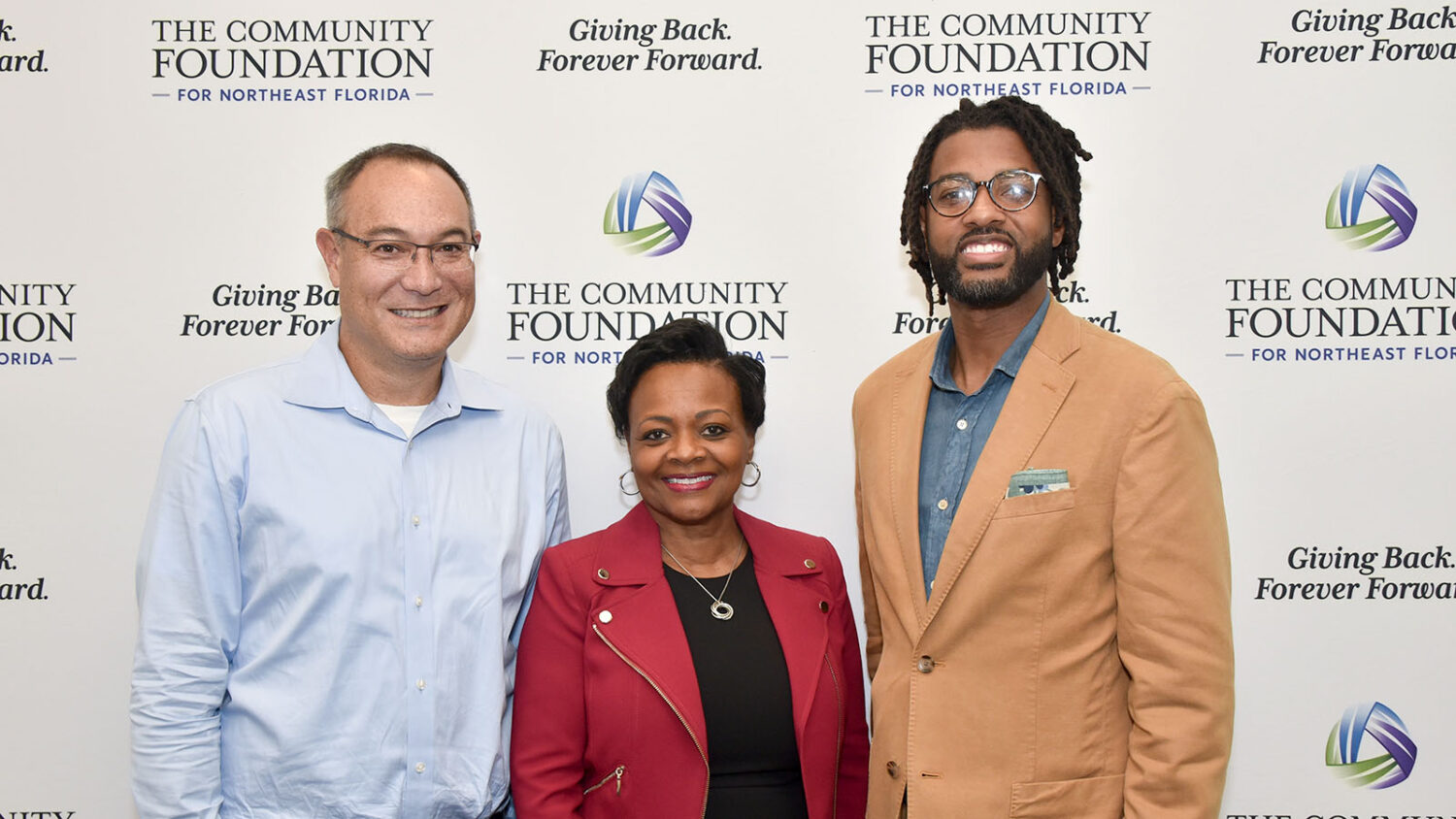On September 5, 2024, The Community Foundation for Northeast Florida hosted a Donors Forum at the University of North Florida’s Adam W. Herbert University Center, to discuss pluralism and philanthropy.
The featured speaker was John Inazu, the Sally D. Danforth Distinguished Professor of Law and Religion at Washington University in St. Louis, and author of Learning to Disagree: The Surprising Path to Navigating Differences with Empathy and Respect. Inazu is the founder of The Carver Project, which aims to connect university, church, and society by focusing on “uncommon community, focused engagement, and creative dialogue,” and he is a senior fellow with Interfaith America, an organization focused on religious diversity.
Professor Inazu’s teaching focuses on the First Amendment freedoms of speech, assembly, and religion, and related questions of legal and political theory. His book Learning to Disagree is a compilation of stories that challenge readers over what it means to be human and offer ideas for how to bring us back to understanding each other. He shared an overview and his thoughts, followed by a question-and-answer session.
Overview of Professor Inazu’s remarks:
- We are deeply divided today about what matters, and this will not be easily resolved. The challenge is finding common ground even when we don’t agree about what is common good.
- We have moved from simply thinking that people we disagree with are wrong, to thinking they are evil. The distinction of wrong vs. evil is consequential.
- In order to lower the stakes, it is important to choose our battles and realize we do not have to weigh in on everything (posting/replying on social media, etc.)
- In order to learn empathy, we can remember that even the most political, even the most accomplished, are human beings underneath. We must meet people where they are and understand our own limits – don’t assume what it is like to be someone. These assumptions do not help bridge relationships.
- Before engaging with someone, be sure you have built trust with them and have recovered the basics of the relationship. Also, go in with a full tank – a good night’s sleep and feeling well. And be prepared for a possible rude/offensive response.
- The Five Applications to put this practice into your own life are:
- Slow down. Don’t see people as interruptions, see the person as they are.
- Listen to understand; people are almost certainly coming from a different perspective than you. You can also study body language and speech to see how you’re being responded to.
- Balance kindness and courage in your words – free speech gives us a right, but also gives us the potential to deeply harm forever. There is a current imbalance where people feel empowered to say way too much with no consequences, and others feel like they can’t speak out and share.
- Recognize your blind spots. Everyone has bias and prejudice, and often they are hidden and reflective of what we don’t know. It’s important to have people in your life who can point this out to you. Work toward understanding context.
- Practice forgiveness; life is the place to make mistakes and work things out. We have to have grace with each other. Remember two important things: 1) You have to know you’re in need of forgiveness 2) You will not be defined by your greatest mistake, and you are capable of being forgiven.
- Rebuilding social trust starts with individual compassion, and this will happen with practice and habits.
- We will all likely screw up, but the only way to implement social change and to fix people is to work on this on the ground and from the ground up.
Overview from the Q&A Session:
- Philanthropy is inherently pluralistic; different donors can be actively funding causes that are mutually exclusive, yet they can still have lunch together. We have to recognize the inherent power dynamic that comes with money – often those people have more power, and we need to be aware of the power plays that happen.
- A lot of relationship across difference involves feeling uncomfortable – if you’re only doing things your way, you’re not putting yourself in a position to experience that discomfort that is necessary for growth.
- In terms of how to implement these practices into a school, it’s important for the school itself to articulate its position and values. Often, these are vague – and they need to be more specific, and to be norms and values, rather than laws and policies (which often don’t work because people don’t buy into them).
- Tips for dealing with factual incorrectness:
- Much of the world is not facts, and there is often a contested interpretation of what happened.
- For those who are denying facts, in order to bring people out of an alternate reality, start with something familiar to them, and find ways to counterbalance or counteract it. Over time, this may bring them back into the world because their alternate reality becomes harder to live in.
- If you have mutual trust, real conversations can happen. Even with friends who have fundamentally different belief systems, it’s possible (and important) to be able to tell each other that we think the other is wrong. And listen to each other and have a dialogue about it.
- Even if you want to engage, it’s not necessarily possible to do it with everyone – nor in a cosmic sense, should you. Sometimes, it’s more important to harness resources to engage people who are more appropriate for the job to do the work. It doesn’t necessarily have to be you.
- There is a lot of middle ground in America. Compromise is possible and can often be generalized for all hard issues. (One example is nuns and Planned Parenthood coming together and working on children’s issues – even though they are far apart on the topic of abortion).
- On a local level, in this and every community, there are lots of things to work on across the aisle that will encourage human flourishing.
- We should also avoid presentism that forgets where we’ve been – there have been massive divides in history and many times of turmoil, along with some successes – and this is not one of them. At the same time, when you move from thinking “wrong” to thinking “evil,” the harder it becomes to reverse. For example, the genocide in Rawanda had its roots in talk radio. So the lesson to learn is that things may get worse before they get better (i.e, with the onset of AI, etc.)
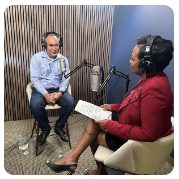 BONUS: Tune in to episode 3 of Forever Forward, as Wanda Willis, VP of Civic Leadership and John Inazu continue the conversation of connecting across differences.
BONUS: Tune in to episode 3 of Forever Forward, as Wanda Willis, VP of Civic Leadership and John Inazu continue the conversation of connecting across differences. Explore More Donors Forum Topics
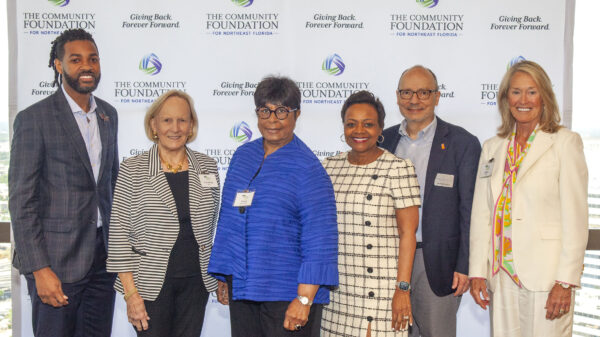
The Impact of Collective Giving
On April 17, 2025, The Community Foundation for Northeast Florida hosted a Donors Forum at the River Club to discuss The Impact of Collective Giving. The featured speaker was Michael Layton, Philanthropy Chair at the Dorothy A. Johnson Center for Philanthropy.
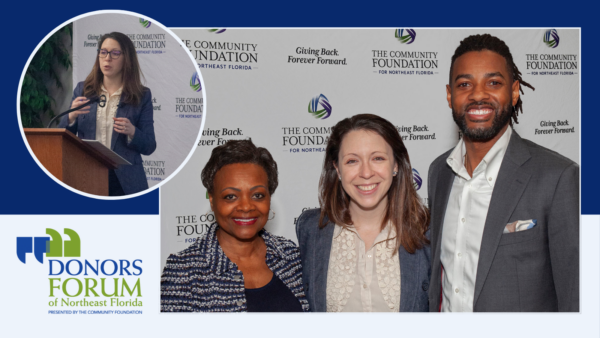
Trends in Philanthropy
On March 25, 2025, The Community Foundation for Northeast Florida hosted a Donors Forum at the UNF Adam H. Herbert University Center to discuss Trends in Philanthropy. The featured speaker was Tory Martin, Director of Communications and Strategic Partnerships for the Dorothy A. Johnson Center for Philanthropy, which just released its report 11 Trends in Philanthropy for 2025.
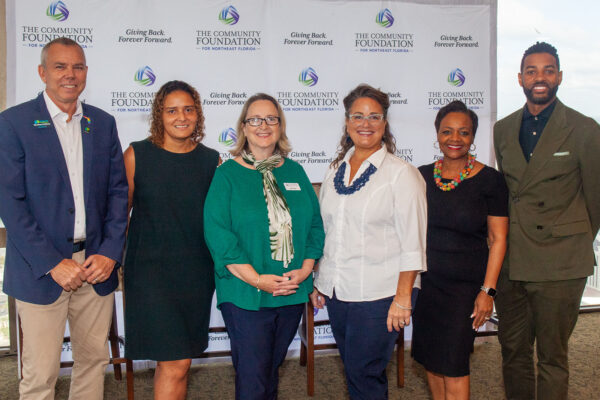
The State of LGBTQ Philanthropy
On October 23, 2024, The Community Foundation for Northeast Florida hosted a Donors Forum to discuss the State of LGBTQ Philanthropy.
